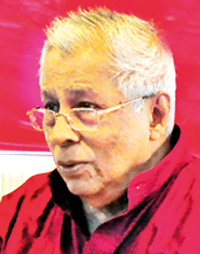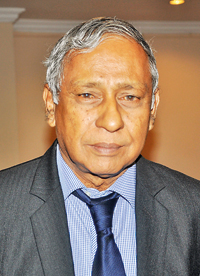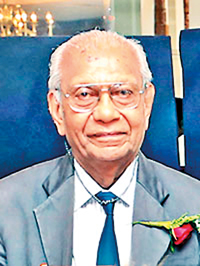Appreciations
View(s):He belonged to that era of trade unionists who rose above party politics
 Batty Weerakoon
Batty Weerakoon
Batty Weerakoon who passed away recently performed many roles during his lifetime. He was a lawyer, trade union leader, leader of the Sama Samaja Party (LSSP), Member of Parliament and had held two ministerial posts, first as the Minister of Science and Technology and then as the Minister of Justice. He was a well-known and respected trade union leader when trade unions performed a meaningful role in industrial relations in the country and were blessed with strong, committed leaders who were role models to their members and knew how to deal productively with employers. His integrity was evident in all the roles he performed.
My relations with Mr. Weerakoon were initially in his capacity as the leader of a trade union, a relationship which over time developed into a more personal one. As a member of the professional staff of the Employers’ Federation of Ceylon I was privileged to have dealt with Mr. Weerakoon from the 1960s until my departure abroad at the end of 1989. As in the case of three other notable trade union leaders of that time – Messrs. L. W. Panditha, N. Shanmuganathan and Bala Tampoe – Mr. Weerakoon’s union was affiliated to a leading political party. He, like the others mentioned, was able to rise above party politics and address issues on behalf of workers based on labour relations principles and worked with the aim of serving the interests of his members and not for the purpose of achieving political objectives.
One of Mr. Weerakoon’s admirable traits was his extreme trustworthiness which accounted for the fact that he and I were able to agree on several matters on the telephone, without having to ask each other to reduce our discussions and decisions to writing. He always stood by such agreements during subsequent negotiations. ‘Batty’ was a gentleman with strong values.
Mr. Weerakoon’s approach to dispute resolution was based on his belief that issues are best resolved through principled negotiation, not a war of attrition. He realized that the centre of gravity of human relations in the world of work was the workplace rather than at the macro level. He believed that the outcome of dispute resolution should to the extent possible, not sour relations between the management and its staff. His ethical principles in the conduct of cases before the labour courts when we appeared against each other were embedded in his value system which we at the Federation respected.
His disciplined, ethical and rational approach and dedication to his responsibilities were admired and appreciated also by several companies. In these ways he contributed to maintaining industrial peace and ensuring better relations between the management and the labour force.
Batty came from an era when trade unionists like him, rather than following the dictates of politicians, were able to influence their thinking.
Sriyan de Silva
An innings cut short, but one that touched us in many ways
 Aubrey Kuruppu
Aubrey Kuruppu
Although family, friends and others who knew Aubrey Kuruppu well are shattered by his untimely death, the manner of his passing, while having tea at the Royal Mall in Kandy, was poignant and in a way appropriate. Aubrey was known to offer tea to anyone he was conversing with at the Arts Faculty Senior Common Room, the many canteens in the University of Peradeniya, Paiva’s Tea Room when it was in existence and in later years at the Royal Garden Mall.
Aubrey and I came from similar backgrounds. We were Anglicans (although he had ceased to be a regular church-goer several years ago) and had attended Anglican schools—he completed his secondary education at S. Thomas College, while I did so at Trinity. He read English for a special degree at the University of Peradeniya in the late ’60s, while I followed almost two decades later. He was Coordinator (Arts Faculty) of the English Language Teaching Unit when I was Head of the English Department from 1992-1998. His office was opposite mine and we could literally see each other when seated at our desks, so would often step into one or the other’s office for a chat.
In 1965, I was in what was then called Standard 5 at TCK when I saw Aubrey play for S. Thomas’ against M.T.M. Zaruk’s Trinity team (they later became contemporaries on campus) and subsequently for the Central Province XI against Mike Denness’ England side at Asgiriya. I vividly recall Aubrey having to retire hurt but returning to battle out an innings against a potent English bowling attack. When I once reminded him of that knock, Aubrey told me an amusing anecdote related to it. He had got a faint edge while batting but did not “walk”, as they say. The umpire had turned down the appeal. According to Aubrey, “These English cricketers know their ‘nicks’ so from that point onwards Tony Grieg and others fielding close to me kept asking if I did not know that I had got a touch and why I had not made myself scarce despite the umpire’s decision.”
Aubrey and I had grown up listening to cricket on BBC Test Match Special, Radio Australia, All India Radio and our own Bertie Wijesinghe/Lucien de Zoysa commentaries. We would often discuss the different styles and idiosyncrasies of individual commentators on radio while exchanging cricket anecdotes. Given this interest, it was inevitable that Aubrey would go on to become an able cricket commentator. He had played the game at club level and (given his English degree) possessed an excellent command of English. Furthermore, he did not feel the need to put on what used to be called a “pol katu” accent to impress anyone. His Sri Lankan way of speaking sufficed. Many cricket followers will miss his voice on radio and his erudite views on the game.
Since Aubrey became a cricket administrator in Kandy, he had access to complimentary tickets to matches and once gave me two passes to watch the Sri Lanka vs. England Test Match at Asgiriya. They were about the best seats in the house in the Old Pavilion with the families of the cricketers. I would often find cricket enthusiasts of his acquaintance besieging him for tickets and he always tried to oblige. Aubrey was indeed a generous man — sometimes to a fault! One day I had occasion to grumble about a person who had borrowed money from me and had seemingly forgotten about it. He laughed off my complaint saying that he could open a bank with the money that people owed him. Many retired hall servants, peons and others regarded him as the “go to” person when in financial difficulty.
The problem in adopting such a stance is that, while many will appreciate his munificence, others could always exploit the situation. As Aubrey’s response to me would suggest, he had the propensity to become a victim of his own generosity. But that is how Aubrey wished to live and I am sure he was blessed for his altruism.
Aubrey had an infectious laugh and a wonderful sense of humour to the point of being boisterous, as some of his colleagues in Peradeniya fondly recalled at his funeral. These characteristics endeared him to those who came from different strata of society. He was equally at home among politicians, diplomats, peons, Vice Chancellors, the higher echelons in the Cricket Board and the schoolboys he coached. Although he was not very comfortable with even semi-formal functions, he would attend my birthday soirées out of a sense of loyalty and would usually be the first to arrive. Sadly his attendance faded in recent years when the challenges of meeting deadlines as a journalist and his moving to a new residence a little away from Peradeniya made it difficult for him to join.
Given his connections, education and leadership qualities, Aubrey could easily have found a lucrative job in Colombo after graduation and retired at the highest level but he preferred the quiet life of a teacher, cricket coach and journalist in the hill country. As he once informed me, quoting Macbeth, “ ‘vaulting ambition’ is not for me.” Journalists would often refer to him as “The evergreen Kuruppu” because he played club cricket for a lengthy period.
Those of us who knew him well are saddened that the Almighty did not extend the innings of this non-smoker, teetotaller and physically active individual. Seventy four years were much too brief a span for such a man. Still we should be glad that he lived long enough to touch our lives in multitudinous ways.
Walter Perera
Pioneering forensic pathologist who never succumbed to pressure
 Dr. M.S.L. Salgado
Dr. M.S.L. Salgado
Prof. Lakshman Salgado was Professor of Forensic Medicine at the North Colombo Medical College along with me till it was taken over by the Government and made the Faculty of Medicine at Ragama.
Prof. Salgado was born in Gintota on September 19, 1930 at the ancestral home of his maternal grandfather who had established a successful import/export business in 1875 with branches in Galle and Colombo and three Indian cities. His father was a surveyor attached to the Survey Department during the British regime and hailed from the well-known Salgado family in Panadura.
Dr. Salgado who had his education at Royal College and Ananda College entered the Colombo Medical Faculty and passed out in 1957.
In 1968 he was sent for postgraduate training in Forensic Medicine to the United Kingdom.
On his return in 1972, he was posted as an Assistant in the Office of the JMO in Colombo and was elected Joint Secretary of the Medico-Legal Society. He was also the secretary of the Sri Lanka Medical Library. It was at the Medico- Legal Society that he came into prominence as he was able to galvanise the society into action and was instrumental in popularising the scientific aspects of forensic medicine and in commencing programmes to educate the public, the judiciary, lawyers and the police in forensic science.
There was renewed interest in the work of the society and its membership increased continuously. He served as the President of the society from 1984–1987.
He was JMO Galle for two years during which time he lived in the ancestral house of his father-in-law, the well-known lawyer and District Judge S.S.J. Gunasekera. Today the ancestral house, No. 26, Church Street, Fort, Galle is leased to the Galle Bazaar Hotel.
He served as JMO Colombo South from 1976 to 1982 and as JMO Colombo from 1982 to 1990. This was a period of turmoil in the country which resulted in a heavy burden being placed on the JMO and his assistants, as numerous acts of violence were taking place, including the killing of 35 prisoners on July 18 and 18 prisoners on July 27, 1983. The period that followed was equally challenging as bombs were exploding from time to time in and around Colombo. It is to his credit that he did not succumb to pressure at any stage and performed his duties in a manner expected of a public servant.
During his tenure as JMO Colombo, the Medico-Legal Morgue was transformed into a fine forensic facility with modern infrastructure and adequate human resources. Forensic radiology and forensic photography facilities funded by the WHO were also introduced.
He was also instrumental in obtaining funding from the WHO to conduct a training programme in forensic medicine for medical officers and a large number of medical officers benefited from this.
He also streamlined procedures relating to medico-legal examination in court. It was during this period that he chaired the 2nd Asia Pacific Congress on Legal Medicine and Science held in Colombo in August 1986, as President of the Medico-Legal Society. The Indo-Pacific Association of Legal Medicine and Science (INPALMS) was inaugurated on August 16, 1986 during this congress and Dr. Salgado was involved in drafting its constitution. He functioned as its President from 1992 to 1998.
On his retirement in 1990, he was appointed the Chair of Forensic Medicine of the North Colombo Medical College and served in this capacity until 1995.
He was also the President of the Sri Lanka Medical Library from 1992 to 1995, till I took over. He served in the council continuously till his death.
Prof. Salgado passed away on August 29, 2019.
His wife, Chinthamani Goonasekera (Dinky) passed away in 2017. He leaves a son and daughter.
He was a devout Buddhist and following the example set by his parents and grandparents gave generously to religious causes and unobtrusively helped the needy in many ways,.
In his last will, he has left his lovely residence at No. 3, Melbourne Avenue, Colombo 4 to the Sri Lanka Medical Association after his unmarried son’s demise.
May he attain the bliss of Nirvana.
Prof. Wilfred Perera


